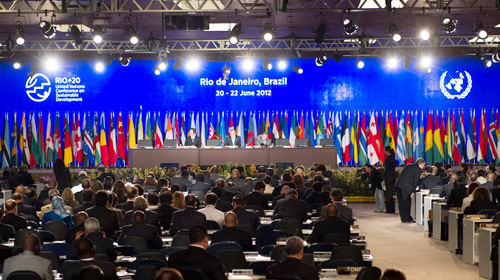|
 |
|
MEETING FOR THE FUTURE: The Rio+20 UN Conference on Sustainable Development opens in Rio de Janeiro on June 20 (WENG XINYANG) |
Twenty years ago, history was made in Rio de Janeiro, Brazil, at the June 1992 Earth Summit, a landmark global meeting that adopted Agenda 21, the Rio Declaration on Environment and Development, and the Statement of the Forest Principles—documents laying down the guidelines for sustainable global development.
On June 20, 2012, the city is once again in the global spotlight as the UN Conference on Sustainable Development, also known as Rio+20, convenes for three days to continue the work of the 1992 summit, as well as the 2002 Johannesburg summit.
Prior to Rio+20, which was attended by more than 130 heads of state or government including Chinese Premier Wen Jiabao, an estimated 50,000 participants from different nations showed up at the UN conference venue, the Rio Center, for a wide range of side events.
Participants in the preparatory events included lawmakers, senior government officials, business executives, and representatives of NGOs and the media. The forums, seminars and workshops they took part in were invariably dedicated to sustainable development issues—environmental protection, poverty relief, corporate responsibility, food security, recycling economy, and equal opportunity of employment.
Thanks to the Earth Summit in 1992, the concept of sustainable development has taken root in the minds of the people around the world. Tangible results have been attained during the past 20 years, as many countries made sustainability a national development priority. China, for instance, published its own agenda as early as 1994, and the country has made significant inroads in reducing poverty—one of the Millennium Development Goals agreed upon by all UN member countries at the UN Millennium Summit in 2000.
However, many of those goals remain largely unfulfilled, according to an assessment released by the UN Environment Program on June 6. The persistent problems of environmental degradation, depletion of natural resources and climate change have worsened, and new problems caused by unbalanced regional development and widening income gaps across the globe continue to emerge. Many people have been led to believe that unless drastic remedies are adopted to reverse the situation, sustainable development will be an unattainable dream.
Opposing positions
The failure to fully carry out those commitments was largely attributed to the confrontation between the developed North and the developing South over the issue of how to approach sustainability.
Zhao Yumin, a research fellow with the Chinese Academy of International Trade and Economic Cooperation (CAITEC), believed that for developing countries, priority should be given to eradicating or reducing poverty and closing the gaps with the developed world. This means they will have to adopt a development model compatible with the actual level of their national development. To them, "sustainable development should be carried out step by step, just like a baby shouldn't be expected to run before he can walk," she said.
According to Zhao, this explained why the Group of 77 developing nations and China insist on "common but differentiated responsibilities." Adopted at the Earth Summit in 1992, the concept is a cornerstone of sustainable global development. Although all countries—developed and undeveloped alike—share a common responsibility for the environment, sustainable policies must take into account each country's different national conditions. According to the framework laid out two decades ago, the North should therefore proactively support sustainability efforts in the South.
|
